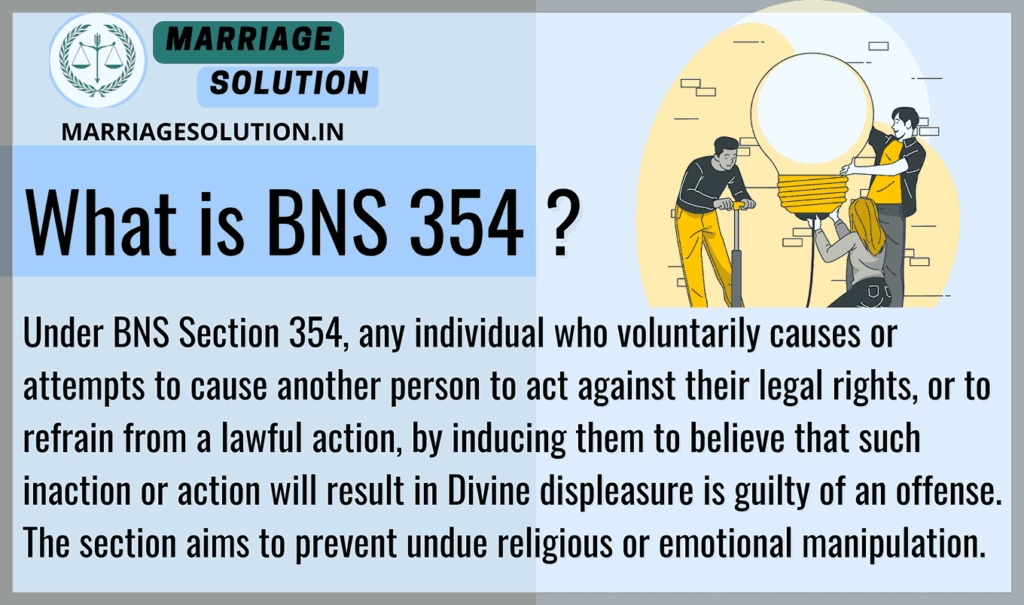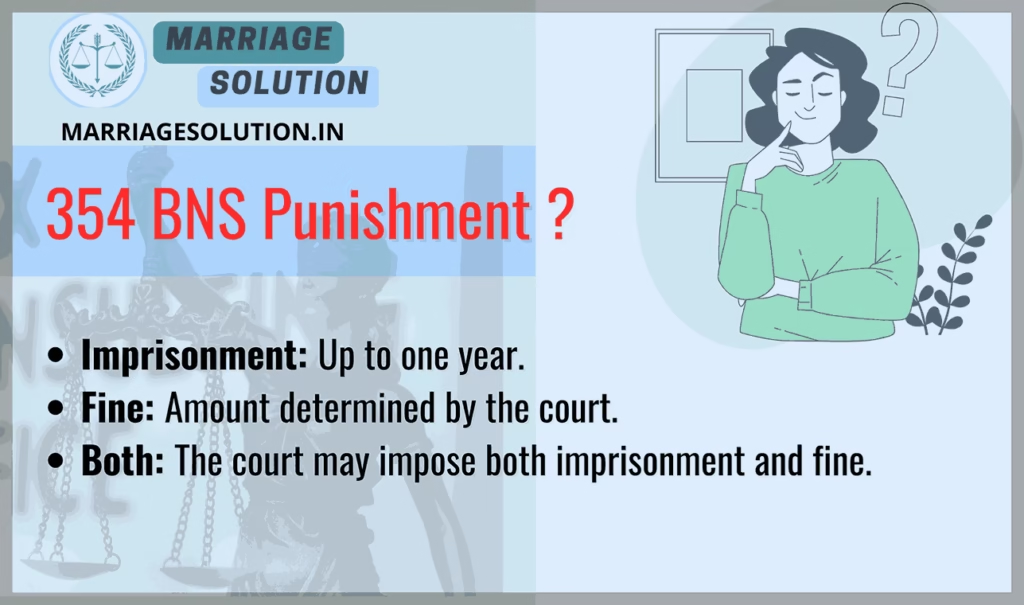Introduction of 354 BNS
354 BNS deals with the offense of coercion by exploiting religious beliefs or fears of Divine displeasure. It criminalizes situations where a person is manipulated into performing or avoiding an action under the belief that non-compliance would bring Divine wrath. This provision ensures protection from spiritual or religious manipulation, safeguarding personal freedom, dignity, and legal rights. By replacing IPC Section 508, BNS 354 strengthens the legal framework against undue influence rooted in religious fear.
The Bharatiya Nyaya Sanhita (BNS) Section 353 replaces the old Indian Penal Code (IPC) Section 508.
What is BNS Section 354 ?
Under BNS Section 354, any individual who voluntarily causes or attempts to cause another person to act against their legal rights, or to refrain from a lawful action, by inducing them to believe that such inaction or action will result in Divine displeasure is guilty of an offense. The section aims to prevent undue religious or emotional manipulation.

BNS 354 in Simple Points
“Whoever induces or attempts to induce a person to act or refrain from acting, by making them believe that non-compliance will bring Divine displeasure, shall be punished with imprisonment up to one year, or fine, or both.”
1. Meaning of the Offense
- Divine displeasure → Fear of anger or punishment from God, deity, or spiritual force.
- Inducing a person → Creating a belief that if they do not obey, they will suffer religious or spiritual harm.
- Example → Forcing someone to sign a document by claiming that refusal will anger God.
This provision safeguards people from psychological and religious manipulation.
2. Essential Ingredient – Coercion through Religious Fear
- The offender must create a belief in the victim that they will be punished spiritually or face divine wrath if they don’t comply.
- Injury or coercion here means:
- Emotional distress through religious fear.
- Exploiting devotion to gain personal benefit.
- Forcing unlawful or unfair compliance.
Example → A sits on protest at someone’s home, declaring divine curse will fall unless demands are met.
3. Punishment under BNS Section 354
- Imprisonment → Up to 1 year.
- Fine → As decided by the Court.
- Both → In serious cases, the court can impose both imprisonment and fine.
This ensures proportionate punishment depending on the nature of manipulation.
4. Nature of the Offense
- Bailable → The accused can secure bail as a matter of right.
- Non-Cognizable → Police need Magistrate’s permission before arrest or investigation.
- Non-Compoundable → Cannot be settled privately; must go through trial.
- Triable by → Any Magistrate.
This classification prevents misuse but still ensures protection against religious coercion.
5. Examples of BNS Section 354 in Action
- Example 1 – Religious Protest
A person threatens divine wrath if their demands during a protest are not fulfilled.
→ Punishable under Section 354. - Example 2 – Family Pressure
A father compels his child to give up property, claiming refusal will invite divine curse.
→ Covered under Section 354. - Example 3 – Innocent Case (Not Offense)
A casually jokes about divine anger without intent to manipulate.
→ Not punishable, as intent is absent.
6. Importance of Section 354
- Protects individual freedom against spiritual and religious coercion.
- Prevents misuse of faith and superstition for personal gain.
- Promotes mental peace and legal independence.
- Ensures that religion is not misused to manipulate lawful rights.
Section 354 BNS Overview
BNS Section 354 deals with the offense of coercing a person by exploiting their fear of Divine displeasure. If someone makes another person believe that their actions—or lack thereof—might lead to Divine anger or punishment, and this compels the individual to act against their will or omit doing something, it is considered a punishable offense under this law.
Key Points of BNS Section 354
1. Protection Against Spiritual Exploitation
BNS Section 354 prohibits the use of religious or spiritual beliefs to force someone into taking certain actions or refraining from lawful activities. This ensures that individuals cannot be manipulated using their faith or fear of Divine punishment, maintaining personal freedom and dignity.
2. Acts Covered Under This Section
The law covers acts where a person is coerced into doing something they are not legally required to do or avoiding something they are entitled to do. For example, pressuring someone to donate money by claiming that refusal would bring Divine anger is punishable under this section.
3. Intent of the Offender
The focus of the law is on the offender’s intent to create fear of Divine displeasure. If a person acts with the objective of forcing another individual to act or omit an action by invoking religious threats, it constitutes an offense. This intent is key to proving the crime in court.
4. Punishment for the Offense
The punishment under BNS Section 354 includes imprisonment for up to one year, a fine, or both. This penalty ensures that such manipulation is discouraged and that individuals engaging in such acts are held accountable.
5. Illustrative Examples
The section includes examples to clarify its application:
- A sits in protest at another person’s house, claiming it will bring Divine anger unless certain demands are met.
- A threatens to harm their child, suggesting that the act would render the victim an object of Divine displeasure unless specific conditions are fulfilled.
Both scenarios qualify as offenses under this section.
6. Classification of the Offense
The offense is classified as non-cognizable, meaning the police need prior approval from a Magistrate to arrest the accused. It is also bailable, allowing the accused to secure bail, and non-compoundable, meaning it cannot be privately settled and must go through a legal process.
7. Prevention of Psychological Pressure
The section recognizes that invoking fear of Divine displeasure can create immense psychological pressure on the victim. By criminalizing such acts, it aims to protect individuals from undue stress and manipulation, ensuring they are free to make decisions without coercion.
8. Protection of Legal Rights
This section upholds a person’s right to act freely within the bounds of the law. It ensures that no one can be forced to act against their will or refrain from exercising their legal rights through spiritual or religious threats.
9. Applicability Across Contexts
BNS Section 354 applies to various scenarios where religious coercion is used. This includes threats during family disputes, protests, or attempts to extort money or favors by invoking Divine wrath. The broad scope ensures that such manipulation is addressed comprehensively.
10. Role of the Judicial System
Cases under this section are triable by any Magistrate. The judiciary plays a key role in determining whether the offender’s actions were intended to manipulate the victim using spiritual threats. The court evaluates evidence and intent to ensure justice is served.
Examples of BNS Section 354
- Example 1: Dharna to Invoke Fear
A sits at the doorstep of Z and announces that failing to perform a certain act will result in Divine displeasure. This act manipulates Z’s beliefs and compels them to act. A has committed an offense under BNS 354. - Example 2: Threat to Harm for Spiritual Coercion
A threatens Z, claiming that unless Z performs a specific act, A will harm their child, causing Z to believe that such harm will invoke Divine wrath. This is an offense under BNS 354.
BNS 354 Punishment
Imprisonment: Up to one year.
Fine: Amount determined by the court.
Both: The court may impose both imprisonment and fine.

BNS 354 bailable or not ?
- Bailable: The accused can seek bail.
- Non-Cognizable: Police cannot arrest without prior approval from a Magistrate.
- Non-Compoundable: The offense cannot be settled between the parties; it requires legal adjudication.
- Triable by: Any Magistrate.
Comparison: BNS Section 354 vs IPC Section 508
| Law | Offense Description | Punishment | Bailable / Non-Bailable | Cognizable / Non-Cognizable | Trial By |
|---|---|---|---|---|---|
| BNS Section 354 | Inducing or attempting to induce someone to act or omit an act by making them believe that non-compliance will bring Divine displeasure. | Imprisonment up to 1 year, or fine, or both. | Bailable | Non-Cognizable | Any Magistrate |
| IPC Section 508 (Old) | Acts caused by inducing a person to believe that they will become an object of Divine displeasure if they do not comply. | Imprisonment up to 1 year, or fine, or both. | Bailable | Non-Cognizable | Any Magistrate |
BNS Section 354 FAQs
1. What does BNS Section 2354 cover?
It deals with coercion by exploiting beliefs in Divine displeasure to manipulate someone’s actions.
2. Is BNS Section 2354 a bailable offense?
Yes, offenses under this section are bailable.
3. What punishment does BNS 354 impose?
Imprisonment up to one year, a fine, or both.
4. What type of offense is BNS 354?
It is a non-cognizable and non-compoundable offense.
5. Who tries cases under BNS 354?
Cases under this section are triable by any Magistrate.
6. Can good faith actions be punished under BNS 354?
No, only intentional acts exploiting beliefs are punishable.
Conclusion
BNS Section 354 plays a vital role in protecting individuals from psychological and spiritual coercion. By penalizing those who misuse beliefs of Divine displeasure to control others, the law upholds personal liberty and prevents exploitation. This provision ensures that no one can be forced to act against their will or omit lawful acts through religious manipulation. It promotes fairness, protects dignity, and builds a safer society where decisions are made freely and without fear.
Need Legal Support?
If you are dealing with court cases, marriage problems, or any other legal issue, our team at Marriage Solution – Lawyer Help is here for you. Simply fill out our quick online enquiry form, and we’ll connect you with the right legal expert to support your needs.
Finished with BNS 354 ? Continue exploring the next provisions of the Bharatiya Nyaya Sanhita (BNS), 2023. Each section includes explanations, examples, and plain-language breakdowns for easy understanding.
- 355 BNS : Misconduct in public by a drunken person .
- https://marriagesolution.in/bns_section/356-bns/
Of Defamation .
- 356 BNS : Defamation.
- https://marriagesolution.in/bns_section/356-bns/
- 357 BNS : Breach of contract to attend on and supply wants of helpless person.
- https://marriagesolution.in/bns_section/357-bns/
Chapter XX – Repeal And Savings.
- 358 BNS : Repeal and savings .
- https://marriagesolution.in/bns_section/358-bns/
Full IPC Section List: https://marriagesolution.in/ipc-section-list
All Indian Law & Blogs: https://marriagesolution.in/indian-law/
Full BNSS Section List: https://marriagesolution.in/bnss_section-list
